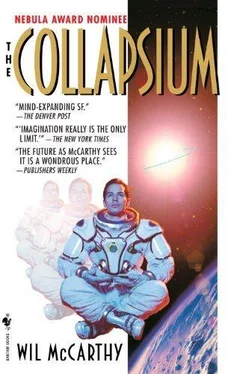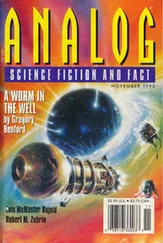“We should be looking for a very large ship, then?” asked Shiao.
“Or a base,” Muddy said. “He’s a deeply private man, fond of’s-s-secret facilities buried in rock. And if he is using gravity lasers in the way I’ve imagined, there would need to be two banks of four, spaced a considerable distance apart. Look for a good-sized asteroid whose sunward face is c-covered in wellstone energy converters. Dead black.”
With great effort and concentration, Bruno fought inertia-lessness to lean as far forward as his straps would allow, and peered at the translucence of the control panel. He knew exactly where the trajectory display should be located, so it wasn’t hard to train his eyes on that spot. It was hard to make anything out there, though. Were those the edges of the plaque? The dashed and dotted lines upon it? He tried to remember where the planets had been, when they’d last seen a glimpse of…
“Mercury,” he said. “It’s close enough—the radio time-lags match. It’s certainly big enough. And I can’t imagine a larger, emptier source of concealment.”
“Or a better source of raw materials,” Muddy agreed. “Mercury, yes.”
“I really don’t feel well,” Rodenbeck complained, in a weaker voice than before. “My limbs have gone entirely numb.”
“All right,” Bruno said, with an accidental and quite sickening nod. “Ship? Why have we stopped?”
“I stopped us,” the ship replied. “The tunnel ahead of us bends too sharply to admit my outer hull.”
“Hmm. You used backup thrusters to do this?”
“Yes. I’m also currently using them to maintain attitude and position. It’s difficult, sir—required thrust is very low to effect a velocity change, but the counterpulse required to damp it is itself a function of position and velocity. The resulting control space has no closed-form solutions.”
“So you’re improvising.”
“Correct, sir. Fuel consumption has stabilized, but remains disconcertingly rapid.”
Rapid? That wasn’t a good thing. “Estimated time of depletion?”
“Two minutes, twenty-four seconds, sir.”
“Oh, dear. Is there enough fuel to back us out of here safely?”
“Negative, sir.”
“Blast. Use some imagination, you! Bring matters like this to my attention before they become irrevocable!”
“I am extremely taxed,” the ship said in its own defense.
Bruno sighed. “All right, then, turn around and pull us out with the grapples; without a fuel supply we’re in more danger in here than we are outside.”
“Acknowledged, sir.”
There was no sense of movement, but the jittering lattice of pinpoints outside the hull began—slowly and jerkily—to rotate.
With a yelp of surprise, Wenders Rodenbeck settled at once to the deck beside Bruno’s couch and remained there.
“Ah, good. You’ve managed to grab hold,” Bruno said, looking down approvingly.
“Actually, friend, I appear to be stuck.” Rodenbeck’s voice was alarmed.
“Stuck?”
“It feels… like gravity. Pretty much exactly like gravity.”
Oh, goodness. Oh, goodness! “Ship, cease rotation!”
But it was too late. The walls hummed with activity, oxygen atoms accelerating near-inertialessly and being expelled at velocities that probably exceeded the vacuum speed of light. But the rotation continued—even began, ponderously, to accelerate.
“I don’t understand,” Deliah van Skeltering protested. “The gravity inside a cylinder should cancel to zero, regardless of position or orientation.”
“A continuous cylinder of infinite length,” Bruno corrected. “Ours is kinked and twisted, and composed of discrete masses, and filled with a Casimir supervacuum that dulls momentum! I’m a fool. Hold on, Wenders, I’ll fish you up.”
“No!” Muddy shrieked. “I forbid it, sir! Keep your hands where they are!”
“Muddy, I—”
“You’ll be killed,” Muddy insisted. “Needlessly, pointlessly killed! You can’t save him in time!”
“You’re saying I’m going to die?” Rodenbeck asked, his breath now coming in gasps.
“Blast it,” Bruno said, quietly, hollowly, because he almost certainly would be killed if he intervened. But perhaps Rodenbeck—an artist, an innocent in this madness—could be saved. With numb fingers, he undid his safety harness. Already he was feeling the beginnings of weight, as the stern of the ship swung close to a collapson node. And for so small a black hole, the gradients would be exceedingly steep. Wenders Rodenbeck was probably already feeling more than a gee, the equivalent of Earth-surface gravity. And in the next thirty seconds…
There was no way to avoid this; the ship couldn’t go forward, couldn’t drag itself backward with grapples, couldn’t go anywhere without turning around. But Bruno should have foreseen this difficulty, should have seen where the danger would occur and then ordered everyone away from it. Steeling himself, he leaned over the side of his couch…
And was whisked, with an instantaneous, all-but-inertia-less flicker of movement, to the bow of the ship.
“I f-f-forbid it,” Muddy said, his hard, solid-wax torso bouncing and skating over Bruno’s own. He held on tightly to something, pinning Bruno to the window there, preventing him from escaping. Muddy had leaped the length of the ship, apparently, to ensure this.
“Let go,” Bruno said urgently. “Let go! I must help him. This is my fault!”
“It isn’t. We’ve never done this before. What man has walked inside collapsium like a tunnel beneath a river? What man can foresee every problem? You saved him once, but this time, Marlon has him for certain.”
“Oh! God!” Rodenbeck cried out, weakly.
“Release me,” Bruno insisted. “We’ve seen deaths before, but I can do something this time. Listen, you coward! You sniveler! Am I really so weak, so selfish? Am I really so capable of being you? Release me !”
“I will not.”
Below, Bruno was just able to see Rodenbeck’s struggling form, pinned to the deck now by several gees. There was no expression on his amoeba face, but the expression in his gasping voice was plain enough: “I told you… this stuff was… dangerous, de To…”
And then he died, his lungs’ strength insufficient to lift their own tremendous weight. He suffocated there at the bottom of the ship, while Bruno and the others, hanging only a few meters away, feeling only the merest stirrings of gravity, did nothing. Terrible sounds rose up from the body as its bones snapped, then shattered, then powdered, until finally Rodenbeck was nothing but a leathery, vaguely man-shaped pancake on the floor. Five hundred gee? A thousand? The gradient itself must have been terrible, a difference of hundreds of gees just between the deck and the space a single centimeter above it. Bruno could see the collapson node there behind Rodenbeck’s body. He watched it pull the remaining remains into a circular mass and drag them along the floor as it rotated by.
And still the jets hummed; still the faint bells tinkled in the air.
“My God,” Deliah said, and began to weep.
Bruno finally stopped struggling.
The rotation continued another fifteen seconds, until finally Sabadell-Andorra proclaimed the maneuver complete. “Eight seconds to fuel depletion,” it added.
“Right,” Muddy said. “Grapples on full. T-take us out of here.”
“Acknowledged, sir. Destination?”
“The planet Mercury.”
Chapter Twenty-Two
in which history’s great wizards clash
There was a lot of talk, once they’d entered normal space again.
“All the things people are doing when they die,” Vivian said quietly. “The things they’re just about to do at the moment the strings are cut. Sometimes nasty, sometimes wonderful, sometimes perfectly ordinary. My grandmother used to say these were things God wanted for himself. She was a kind of Muslim, I suppose—her God was always needy and bitter like that. Not remote, though—he was right there looming over her all the time, like a drunk uncle. But when she died she wasn’t doing anything special, just sitting by the window in her rocking chair, wrapped up in an old blanket.”
Читать дальше












